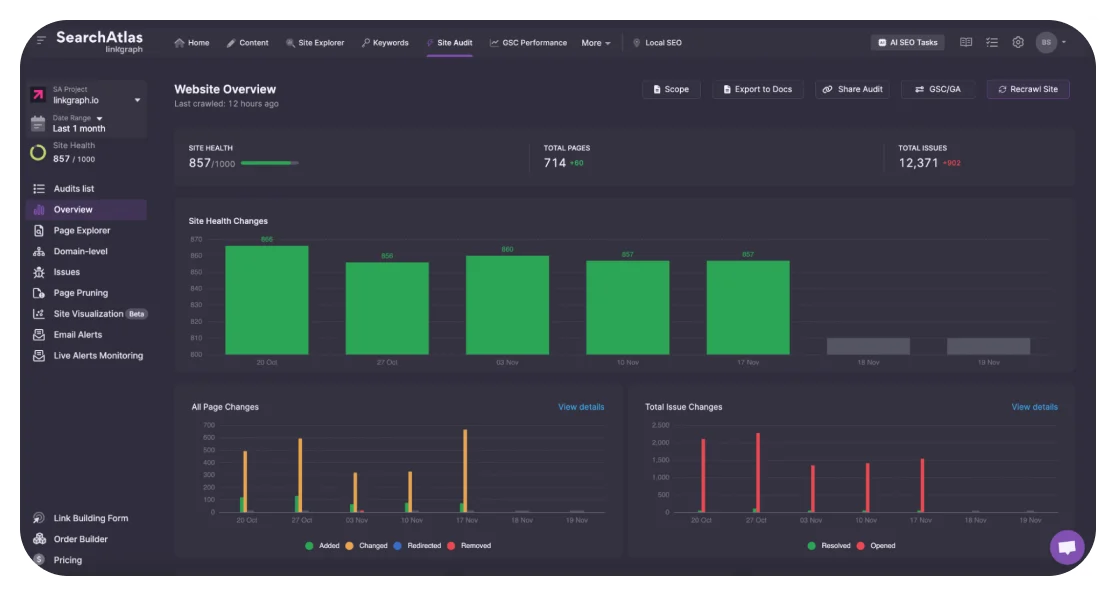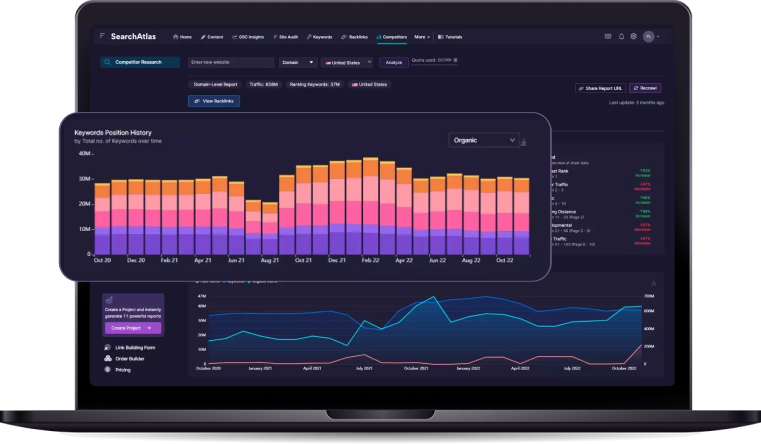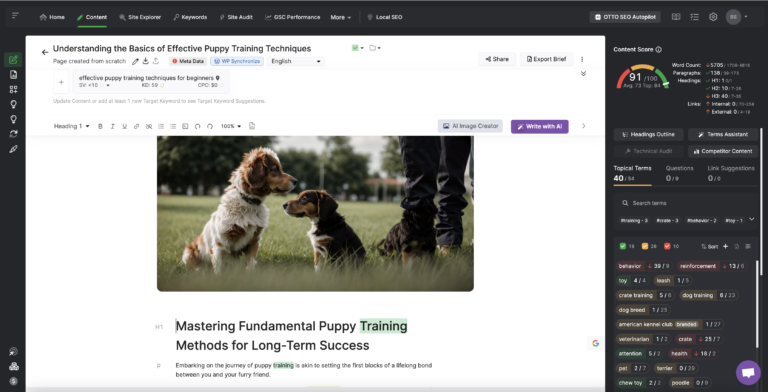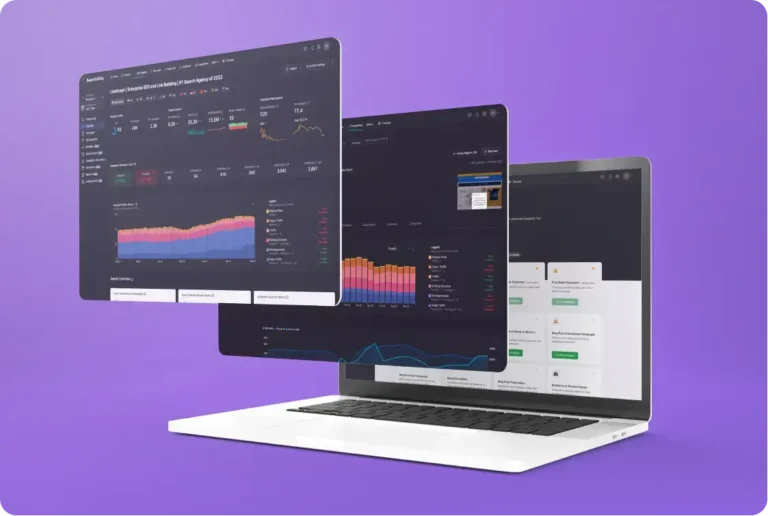Enhancing Your SEO: Mastering Natural Text Optimization Without Relying Solely on Exact-Match Keywords
In today’s intricate web of search engine optimization, mastering natural text optimization is pivotal for businesses aiming to capture the attention of both search engine crawlers and human readers.
Shifting from a narrow focus on exact-match keywords to a broader, semantic SEO approach can significantly enhance a web page’s relevancy and user experience.
Recognizing the indispensability of smart content structuring and the nuanced power of synonymous phrases, organizations can craft web copy that resonates with their audience’s search intent.
By prioritizing a user-centric optimization strategy that seamlessly integrates contextual keywords, your content becomes a beacon for organic search traffic.
Keep reading to unravel the sophisticated tapestry of modern SEO practices that will elevate your digital presence.
Key Takeaways
- Search Atlas Utilizes NLP and Machine Learning to Align Content With Search Intent and Improve SEO Performance
- The Platform Offers Advanced Tools for Seamless Integration of Contextual and LSI Keywords, Enhancing SEO Strategy
- Search Atlas Helps Maintain a Balance Between Keyword Density and Content Readability for Optimal User Experience
- Strategic Use of Synonyms and Precise Language Provided by Search Atlas Can Broaden Content Reach and Relevance
- Continuous Monitoring and Adjustment of SEO Strategies Through Search Atlas Tools Are Crucial for Competitive Online Presence
Grasping the Essence of Natural Text Optimization

The digital marketing landscape is an ever-evolving domain where precise keyword insertion no longer suffices for search engine optimization.
Savvy professionals have shifted their focus toward natural text optimization—a methodology that not only improves SEO performance but also resonates deeply with human readers.
Search Atlas stands as a beacon in this realm, empowering users to harness the power of natural language processing (NLP) and machine learning to craft content that aligns seamlessly with search intent.
This subsection delves into the refinement of SEO strategies by elucidating the importance of understanding search queries beyond the surface level, highlighting the delicate equilibrium between keyword density and content readability, and offering insights into techniques for creating copy that captivates both search engine crawlers and the target audience.
By addressing these critical elements, brands can foster an organic connection with consumers, ultimately enhancing user experience and boosting search engine rankings.
Understanding Natural Text Optimization in SEO
In the intricate tapestry of search engine optimization, natural text optimization emerges as a subtle art. It transcends the concept of strategic keyword placement, ushering in a content creation ethos that leverages NLP and machine learning algorithms like RankBrain to produce text that captures the nuances of search queries while adhering to human language intricacies.
Professionals in the realm of SEO harness Search Atlas to navigate through the complex web of search intents and keyword relevance. This holistic approach aids in formulating content that not only reverberates with search engine results pages but also with the sensibilities of human readers, enhancing the search experience across devices and platforms.
The Role of Search Intent in Natural Writing
Search Atlas facilitates an immersive dive into the pivotal aspect of search intent, allowing writers to craft narratives that cater to the underlying needs and questions posed by searchers. By distinguishing between informational, navigational, and transactional queries, the platform enables professionals to tailor their content marketing strategies to the expectation of their audience, ensuring that the text produced is pertinent and engaging.
Aligning content with user intent involves more than recognizing the superficial keywords—it’s about understanding the purpose behind a searcher’s query. Search Atlas positions its users to decode this intent and reflect it within their writing, which ultimately leads to the creation of web pages that speak to the customer’s journey and foster an authentic user experience.
Balancing Keyword Use With Readability
In today’s search engine optimization landscape, the focus on keyword density must be balanced with the paramount importance of creating readable, engaging copy. Search Atlas arms professionals with advanced content optimization tools that analyze text for keyword usage and ensure that the readability remains high—never compromising the quality of prose for the sake of incorporating a focus keyword.
It becomes a juggling act of sorts: matching keywords to searcher needs while maintaining a natural flow within the document. Search Atlas assists by providing feedback on keyword integration and encourages the use of varied language, which enhances the material’s accessibility for both search engines and the human reader:
- Evaluating keyword density to prevent overly contrived text
- Analyzing the readability to align with the user’s search experience
- Encouraging the use of synonymic phrases and a diversity of lexicon to mirror human conversation
Techniques for Writing Engaging and Organic Content
In the confluence of SEO and content excellence, Search Atlas unveils an array of tools for curating content that speaks to both the search engine and the essence of human inquiry. Strategic storytelling employs the Topical Map and Content Planner to yield blog ideas that encapsulate the full spectrum of a search term, therefore transcending the limitation of relying solely on primary keywords.
Moreover, with the innovative On-Page Audit Tool, the content undergoes a meticulous review process, ensuring that each web page not only meets SEO benchmarks but also exemplifies content that is coherent, compelling, and rich with intent and context, thereby cultivating a more organic search presence and higher engagement rates.
Beyond Exact Keywords: The Semantic SEO Approach

In the pursuit of refining search engine optimization, marketers are embracing the complexities of semantic search, a dynamic component of modern SEO that seeks to parse the context and intent behind user queries rather than relying solely on exact-match keywords.
This nuanced approach requires an understanding of how search engines interpret and connect the subtleties of human language to deliver search results that align more closely with user intent.
By exploring the interplay of latent semantic indexing (LSI) keywords, and deploying topic clusters strategically, professionals can significantly elevate the relevance and authority of their content.
This methodology not only enriches the SEO strategy but also positions web pages as valuable resources within the fabric of search engine results, effectively bridging the gap between searcher expectations and content delivery.
Exploring Semantic Search and Its Impact on SEO
In the realm of SEO, semantic search represents a transformative shift from keyword-centric strategies to a more holistic understanding of content and its context. This method seeks to mimic the cognitive processes of humans, where search engines like Google interpret the intent and related concepts of a search query to present the most relevant results.
As professionals embed semantic search practices in their content optimization efforts, they witness a marked improvement in their brand’s visibility and user engagement. This progression towards semantic understanding acknowledges that keywords are not isolated entities but part of a larger, interconnected linguistic web that informs search engine algorithms:
- Search Atlas equips users with tools to develop semantic-rich content, elevating relevancy and domain authority.
- Enterprise SEO demands an embrace of semantic strategies to achieve long-lasting, competitively advantageous search engine rankings.
- Through semantic optimization, including LSI keywords and thematic consistency, content becomes more than a sum of its parts—it transforms into an insightful journey, meeting the consumer’s quest for information and solutions.
How to Leverage LSI Keywords Effectively
Embracing Latent Semantic Indexing (LSI) as part of an SEO strategy requires a keen understanding of content context and the relationships between words. Professionals using Search Atlas can streamline this process by identifying LSI keywords that align with the core topics and enhance the comprehensiveness of their content. The infusion of these semantically related terms contributes to a richer, more informative user experience while simultaneously signaling relevancy to search engine algorithms.
Effective deployment of LSI keywords is rooted in subtlety; they should augment the text without overshadowing the primary keyword. With Search Atlas’ suite of tools, SEO experts can expertly weave these supporting keywords into their web pages, bolstering the semantic integrity of the content. This strategy not only supports organic search rankings but also constructs a narrative that is both informative and engaging, fostering a deeper connection with the audience.
Utilizing Topic Clusters to Enhance Content Relevance
In an SEO landscape that venerates content relevance, topic clusters have become a linchpin strategy for professionals aiming to enhance the quality and scope of their search engine presence. This approach, meticulously supported by Search Atlas’s capabilities, involves creating a constellation of content pieces anchored around a central theme, thereby establishing a network of expertise that search engines interpret as a sign of authority on the subject matter.
By meticulously crafting these interconnected content groups, experts elevate the topical strength of their sites, affording each individual piece the opportunity to benefit from the collective domain authority. Search Atlas aids in this endeavor by facilitating the identification of relevant subtopics, ensuring that each cluster maintains a high level of quality and connectivity, thus becoming more visible and prominent in the search engine results pages (SERPs).
Smart Content Structuring for Better SEO

As digital marketing experts navigate the intricate dance between search engine algorithms and user engagement, smart content structuring takes center stage, ensuring that web pages not only appeal to search engine crawlers but also captivate the human reader.
This involves a strategic approach to every content layer: from crafting headlines that spark curiosity without succumbing to keyword stuffing, to employing subheadings that guide the user and enhance SEO, down to paragraph optimization where content vitality is key for sustained engagement.
Through expert deployment of these structural elements, Search Atlas equips professionals with the ability to create content that excels in both search engine optimization and user experience.
Crafting Compelling Headlines Without Keyword Stuffing
The dilemma of crafting headlines that captivate without resorting to an excess of keywords is one that Search Atlas navigates with finesse: it marshals SEO expertise with a copywriter’s touch for headlines that spark interest and promise value. A headline must arrest attention, promising readers the answers they seek while simultaneously signaling to search engines the topic’s relevance.
Effective headline creation is a pivotal skill, as Search Atlas demonstrates; it requires the blending of creativity with analytics to distill the essence of the content into a clear, compelling invitation. This balance ensures that headlines act as gateways, enticing the visitor to delve deeper into the web page while respecting the nuances of search engine algorithms.
| Component | SEO Importance | User Impact |
|---|---|---|
| Headline Clarity | Signals Topic Relevance | Offers Clear Entry Point |
| Creative Expression | Encourages Clicks | Engages Curiosity |
| Keyword Optimization | Improves Visibility | Aligns with Search Intent |
Effective Use of Subheadings for SEO
Subheadings serve as navigational beacons within a web page, guiding search engine crawlers through the hierarchy of information and delineating topics of significance. Their strategic incorporation into content not only breaks text into digestible sections but also provides additional opportunities to weave target and LSI keywords into the page, bolstering SEO without compromising the natural reading experience.
Integral to the content’s architecture, subheadings do more than improve readability; they contribute to a page’s topical relevance as perceived by search algorithms. By conveying the substance of the ensuing text, they enable search engine crawlers to grasp content themes efficiently, thus supporting the content’s ability to rank well for related queries in SERPs and fostering a better match with user intent.
Paragraph Optimization for Improved Engagement
In the pursuit of SEO excellence, paragraph optimization stands as a crucial but often overlooked component of on-page content strategy. Crafting succinct paragraphs that are rich in information, yet accessible and engaging, helps maintain visitor interest and can improve the time spent on a page, a subtle but powerful factor in search engine evaluations.
Paragraphs optimized for engagement and SEO strike that delicate balance: they’re brief enough to cater for skim readers and detailed enough to satisfy those craving in-depth content. This careful calibration is what Search Atlas encourages, allowing the user’s web content to embody clarity, authority, and digestibility:
- Concise paragraphs to enhance readability and retain visitor attention
- Strategic inclusion of relevant keywords and synonyms to maintain SEO without overstuffing
- A narrative flow that guides readers smoothly from one point to the next
The Power of Synonyms in SEO Content Writing

Embracing the dynamism of search engine optimization necessitates a departure from sole dependence on exact-match keywords and warrants the strategic use of synonyms to enrich the textual landscape of web content.
The subtleties of language enable savvy marketers to craft prose laden with synonyms, enhancing the narrative without succumbing to the pitfalls of over-optimization.
Recognizing the profundity of synonym application primes content for expanded reach and relevance, nestling neatly within the parameters set by search engines to avoid penalties.
Furthermore, leveraging modern tools to unearth the optimal synonyms ensures that the content breathes authenticity while achieving scalability within content marketing campaigns.
Identifying and Applying Synonyms for Rich Text
In unearthing the right synonyms for SEO content, the discerning use of Search Atlas’s robust language tools plays a critical role. They equip SEO professionals with the ability to source semantically related variants that harmonize with the focal keyword, enriching the text while evading the pitfalls of keyword overuse.
Application of these synonyms requires precision; they must be contextually appropriate to maintain the original message and search intent. By judiciously integrating these linguistic alternatives, content writers can enhance the richness and depth of their prose, satisfying search engines and readers alike with a compelling narrative thread that weaves through the digital tapestry of their content.
Avoiding Over-Optimization and Penalties
Insightful deployment of synonyms by SEO experts serves as a hedge against the risks of over-optimization—a common pitfall where excessive repetition of keywords leads to content that appears forced or manipulative to search engine algorithms. Search Atlas empowers these practitioners with the finesse to incorporate variations that maintain organic content richness, thereby sidestepping potential penalties by search engines eager to reward content that holds true to natural language use.
Neglecting the delicate balance between keyword presence and content variety can trigger red flags in search engine evaluations, potentially diminishing a website’s search visibility. The strategic use of synonyms proffered by Search Atlas aids professionals in designing content that aligns with search engine preferences while avoiding the detrimental effects of keyword stuffing, paving the way towards improved search performance without compromising the integrity of the text.
Tools to Find the Right Synonyms for Content Expansion
Search Atlas’s suite of advanced SEO tools includes sophisticated synonym finders that aid content creators in broadening their lexical range, ensuring language variety in their copy. The facility to extract appropriate synonyms enhances the writer’s ability to generate expansive, SEO-friendly content while maintaining the intrinsic value and meaning of the work.
Armed with these powerful resources, professionals can effortlessly tailor content that mirrors natural speech patterns, demonstrating relevance and expertise to search engines. The emphasis on synonym usage allows for a broader canvas upon which SEO strategies unfold:
- Strategically selected synonyms enhance text without detracting from the central message.
- Tools facilitate the discovery of contextual synonyms that support SEO without keyword stuffing.
- Expansive, semantically-rich content becomes attainable, appealing equally to search algorithms and human readers.
These intelligent synonyms empower authors to build rich narratives that resonate with both search engines and the human audience, solidifying the brand’s online presence and bolstering organic search success.
User-Centric Optimization: Focusing on User Experience

In an era where search engine optimization intricately intertwines with user satisfaction, adapting SEO efforts to prioritize user experience becomes imperative.
An exceptional navigation and reading experience acts as a cornerstone in retaining visitors and fostering engagement.
In this context, enhancing readability transcends aesthetic appeal and emerges as a fundamental aspect of SEO, pertinent to the efficacy of web pages in catering to a diverse audience.
At the same time, considering the ubiquity of mobile usage, optimizing text flow for various screen sizes and elevating content accessibility ensures that comprehension is seamless across all devices and user abilities.
This section will explore pivotal strategies aimed at enriching user interaction through meticulous attention to readability, device compatibility, and content clarity, thereby augmenting the potency of organic search efforts.
Enhancing Readability for a Diverse Audience
Distilling complex ideas into easily understandable language underpins the creation of content that caters to a broad audience. Search Atlas provides tools that aid in striking the right balance between technical accuracy and approachability, thereby ensuring that content not only hinges on the pertinence to the search query but also maintains simplicity to cater to varying levels of reader expertise.
SEO experts recognize that the elegance of content is measured not by its linguistic complexity but by its clarity and ease of understanding across different segments of society. Leveraging Search Atlas’s capabilities, professionals sculpt content with precise diction and syntax that resonates with the audience, leading to a more inclusive and enriched user experience.
Mobile Optimization and Text Flow
Mobile optimization is paramount in modern content marketing, as vast numbers of users access the internet via smartphones and tablets. Search Atlas provides an advanced toolkit that ensures text displays elegantly on smaller screens, enabling a fluid reading experience that naturally adapts to varying device dimensions.
Text flow on mobile devices commands meticulous attention to detail; it is essential for maintaining reader engagement and reducing bounce rates. Professionals utilize Search Atlas to refine web page layouts, ensuring text is easily scannable and navigation is intuitive, thereby enhancing the overall user experience and contributing to SEO success.
Improving Content Accessibility and Comprehension
Achieving content accessibility and comprehension is a significant facet of user-centric optimization, with direct implications on SEO efficacy. Search Atlas champions this approach by providing content management tools that scrutinize copy for clear communication, ensuring it is decipherable by both human readers and search engine crawlers.
By emphasizing alt text for images, coherent anchor text for hyperlinks, and employing screen reader-friendly formatting, Search Atlas supports professionals in creating content that maximizes comprehension for all audience members. This inclusive strategy not only respects the diversity of user needs but also enhances the content’s relevancy and appeal in the search engine landscape.
The Importance of Contextual Keywords in Modern SEO

In the intricate quest for heightened search engine visibility, contextual keywords emerge as a pivotal element of an effective SEO strategy.
Their subtle integration can elevate a brand’s narrative, allowing for a seamless and meaningful connection with the evolving algorithms of search engines.
Professionals venturing to decode this sophistication of search engine optimization focus on the tripartite nexus of discovery, incorporation, and measurement.
Understanding contextual keywords, embedding them tactically within web content, and assessing their influence on search rankings form the foundation of advancing SEO.
This approach sheds the obsolete reliance on exact-match keywords and paves the way for a layered optimization process that mirrors the fluid nature of human language and search behaviors.
What Are Contextual Keywords and How Do They Work
Contextual keywords represent the evolution of SEO tactics, where the emphasis shifts from an unwavering focus on specific exact-match keywords to the nuanced application of terms and phrases that relate to the overall subject matter of a web page. This method aligns with the intuitive understanding of content by search engines, which now interpret the context surrounding keywords to provide search results that better match the user’s intent.
These keywords work by contributing to a more comprehensive semantic footprint of a document, offering search engines clues about the subject more organically. By understanding and leveraging this principle, Search Atlas equips SEO professionals with the means to enrich content relevance and authority, hence improving a page’s compatibility with sophisticated search algorithms that prioritize context and user experience.
Strategies for Integrating Contextual Keywords in Your Content
Incorporating contextual keywords requires a strategic finesse supported by comprehensive SEO tools like those provided by Search Atlas. Professionals leverage these capabilities to weave contextual keywords naturally into content, thus ensuring that each term enhances the narrative while contributing to the page’s SEO value.
Integrating these keywords goes beyond mere placement; it’s about crafting content where terms emerge organically from the topic being discussed. The proficiency lies in creating a congruence where contextual keywords support the core message and supplement the user’s search journey:
- Contextual keyword identification aligns closely with the audience’s intentions and the subject matter.
- Integrative writing incorporates these keywords to enrich descriptive passages and analyses within the content.
- Regular SEO performance assessment ensures these contextual references are effectively assisting in SERP ranking improvements.
Measuring the Impact of Contextual Keywords on Rankings
Accurately gauging the influence of contextual keywords on website rankings can transform an SEO campaign, offering tangible insights into the effectiveness of content optimization. Contemporary search engines reward content that exhibits a deep understanding of topics by prioritzing pages with strong contextual signals in their rankings.
Quantitative metrics such as organic search traffic, keyword ranking positions, and the click-through rates of pages offer a data-driven snapshot into the performance of contextual keywords. To distill the full story of a keyword’s impact, professionals meticulously cross-reference these analytics with user engagement metrics like time on page and bounce rates:
- Examining shifts in organic search metrics post-implementation of contextual keywords highlights direct SEO outcomes
- Correlating user engagement data provides a layer of context to the keywords’ effectiveness in appealing to the target audience
- Advanced ranking tools within Search Atlas help attribute content performance improvements to specific contextual keywords
Dedicated analysts deploy robust SEO platforms like Search Atlas to track and interpret these nuanced changes, thereby optimizing strategies for peak performance in the dynamic landscape of search engine results pages (SERPs).
Monitoring and Adjusting Your SEO Text Strategy

Within the expansive landscape of SEO, the efficacy of a text strategy is not static but a dynamic orbit that requires continuous monitoring and adjustments to maintain alignment with search engine algorithms and user needs.
The adept use of tools to trace keyword performance stands as a vital gauge, while probing user behavior provides the insights necessary to hone content.
Understanding when and how to update content and keyphrase strategies is a crucial piece of the SEO puzzle, ensuring content remains not only relevant but competitive in the digital marketplace.
This requires a blend of analytical prowess and a nimble approach to the ever-shifting tides of search trends and algorithm updates.
Setting Up Tools to Track Keyword Performance
Modern SEO practitioners employ Search Atlas’s extensive suite of tools to track keyword performance with impeccable precision. These tools provide real-time data on search volume, keyword rank over time, and visibility across search engines, serving as a compass to direct SEO efforts more effectively.
Diligent monitoring of keyword metrics via Search Atlas allows for swift adaptations to search engine optimization strategies. This enables SEO experts to fine-tune their use of contextual and related keywords in their content, ensuring that their approach remains agile in the ever-evolving digital landscape.
Analyzing User Behavior to Refine Content
Delving into user behavior analytics presents a nuanced understanding for content refinement, a key practice for aligning SEO strategies with real-world user engagement. By studying patterns in site navigation, click-through rates, and time spent on content, professionals can identify which aspects of their content resonate with visitors and which ones require augmentation.
Assessing the ways in which users interact with content allows experts to sharpen the focus of SEO campaigns, ensuring that textual strategies stay relevant and compelling. This data-driven approach to content optimization ensures that every web page serves both the needs of the audience and the goals of search engine visibility:
- Site navigation analysis reveals content discoverability and user flow.
- Click-through rates highlight content with the highest user appeal.
- Engagement metrics like time on page can indicate content depth and value.
When to Update Content and Keyphrase Strategy
Recognizing the ideal moments to update content and keyphrase approaches is fundamental to maintaining a vibrant online presence. Content refreshes should be scheduled when shifts in search trends emerge or when current information no longer reflects industry advancements and customer expectations.
| SEO Element | Indicators for Update | Strategic Actions |
|---|---|---|
| Content Freshness | Outdated information, declining traffic | Revise with current data, incorporate emerging trends |
| Keyphrase Relevance | Change in search patterns, poor SERP performance | Implement updated keyword research, realign strategy with user intent |
| Competitor Content | Competitor updates, new market entrants | Analyze competitive landscape, refine unique selling proposition |
Moreover, the keyphrase strategy warrants a review when algorithmic updates by search engines alter the keyword landscape: this ensures that content avails upon the most current SEO practices and maintains a competitive edge in search rankings.
Frequently Asked Questions
What is natural text optimization and how does it differ from using exact-match keywords in seo?
Natural Text Optimization involves enhancing the relevance and flow of content by utilizing synonyms, related phrases, and contextually appropriate language that aligns with user intent and search queries, rather than relying solely on the repetition of exact-match keywords. This approach contrasts with traditional SEO practices that prioritize frequency of specific search terms, instead focusing on the quality and readability of the copy to satisfy human readers and search engine algorithms’ increasing sophistication.
How does the semantic seo approach enhance content optimization and cater to search engine crawlers?
Semantic SEO taps into the understanding of searcher intent and contextual meaning, allowing writers to create content with a deeper relevance to search queries. By leveraging natural language processing and thematic connections, this approach not only enriches the user experience but ensures that search engine crawlers can accurately interpret and index the web page, fostering a more favorable position in search engine results pages.
What are some effective strategies for structuring content to improve seo and user experience?
Effective strategies for structuring content to enhance both search engine optimization and user experience include the integration of keyword research to align with search intent, the application of natural language processing to ensure content relevancy and readability, and the systematic use of on-page elements like headings, alt text for images, and anchor text variation to assist both search engine crawlers and human readers. Another vital approach involves organizing content with the user’s journey in mind, employing topical maps and SEO tools such as Search Atlas, which streamlines this process by providing insights based on search volume, competitor analysis, and SERP features to craft content that resonates with the audience’s queries and enhances the overall search experience on every device.
How can the use of synonyms in seo content writing benefit search engine rankings?
The strategic deployment of synonyms in SEO content writing can enhance the relevancy of a web page to a broader array of search queries, potentially improving its visibility on search engine results pages. By diversifying language and considering semantic search, authors align content more closely with the nuanced language patterns of searchers, thus catering to machine learning algorithms like RankBrain that interpret user intent and context, leading to improved search engine rankings.
Why is user-centric optimization important and how does it contribute to overall seo success?
User-centric optimization is pivotal in SEO as it aligns a website’s performance with the preferences and behaviors of its target audience, thereby enhancing the user experience. By prioritizing the user’s needs, this approach contributes to overall SEO success by encouraging longer engagement, improving user satisfaction, and ultimately leading to better search engine rankings through signals like increased time on site and lower bounce rates.
Conclusion
Mastering natural text optimization without over-relying on exact-match keywords is crucial in elevating your SEO efforts.
Embracing a more nuanced approach to content creation, attentive to search intent and user engagement, can significantly improve search engine rankings and user experience.
Tools like Search Atlas can guide you in exploring the subtleties of language use, integrating contextual keywords, and utilizing synonyms effectively.
By crafting readable, informative, and organically flowing content, you cater to both search algorithms and human readers, fostering a connection that resonates with the customer’s journey.
Continuously monitoring and adjusting your SEO strategy is essential to remain relevant and competitive.
Ultimately, focusing on natural text optimization ensures that your content remains authentic, engaging, and primed for success in the evolving digital landscape.









